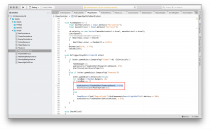Author Archives: Léo Félix Smith
Blog #6: Postmortem
Hello and welcome to my final blog post concerning the development of our game, “Umibōzu”!
I am Léo and the Scrum Master of Team Wendigo. In today’s post, I will talk about the final result of our game. First, I want to provide you with some context of our project and provide some insight to our development processes. About nine weeks ago, we sat in the lecture hall and attended the first lecture of our new course. The course Game Design […]
Blog #6: Postmortem
Hello and welcome to my final blog post concerning the development of our game, “Umibōzu”!
I am Léo and the Scrum Master of Team Wendigo. In today’s post, I will talk about the final result of our game. First, I want to provide you with some context of our project and provide some insight to our development processes. About nine weeks ago, we sat in the lecture hall and attended the first lecture of our new course. The course Game Design […]

Blog #5: How playtesting shaped one of our core mechanics
Hello and welcome again to my blog!
I am Léo and Scrum Master of Team Wendigo. Today, I will talk about playtesting and how it has affected the development of our game, “Umibōzu”. Playtesting is a crucial part of game development. Whether a mechanic is “fun” in a game is often discovered through the iterative and incremental nature provided by the Scrum framework (check out my blog post on Scrum). The Empiricism principle (“inspect and adapt”) as well […]

Blog #5: How playtesting shaped one of our core mechanics
Hello and welcome again to my blog!
I am Léo and Scrum Master of Team Wendigo. Today, I will talk about playtesting and how it has affected the development of our game, “Umibōzu”. Playtesting is a crucial part of game development. Whether a mechanic is “fun” in a game is often discovered through the iterative and incremental nature provided by the Scrum framework (check out my blog post on Scrum). The Empiricism principle (“inspect and adapt”) as well […]

Blog #4: Making a sound from scratch
Hi!
I’m Léo, Scrum Master and sound dude of team Wendigo. In today’s blogpost, I will discuss how I made the sound of the enemy squid shooting. In our game, “Umibōzu”, the squid is an enemy that shoots ink projectiles. Like all enemies, obstacles, and power ups in the game, when the squid is in the darkness, it is only visible as a silhouette to the player.
Silhouettes everywhere…
Only when the fishing boat’s spotlight is shone on a silhouette is the true […]

Blog #4: Making a sound from scratch
Hi!
I’m Léo, Scrum Master and sound dude of team Wendigo. In today’s blogpost, I will discuss how I made the sound of the enemy squid shooting. In our game, “Umibōzu”, the squid is an enemy that shoots ink projectiles. Like all enemies, obstacles, and power ups in the game, when the squid is in the darkness, it is only visible as a silhouette to the player.
Silhouettes everywhere…
Only when the fishing boat’s spotlight is shone on a silhouette is the true […]

Blog #3: The importance of sprint retrospectives
Hello and welcome to my third blog entry!
For the development of our Shoot ‘em Up game we were instructed to apply the Scrum framework. Scrum is an Agile framework that is extensively applied in the software development industry (and thus applicable to game development). By placing high value on the Agile philosophy and preserving Scrum principles, game development teams can become very effective and ensure a valuable product is being developed. An emphasis on iterative development, incremental […]

Blog #3: The importance of sprint retrospectives
Hello and welcome to my third blog entry!
For the development of our Shoot ‘em Up game we were instructed to apply the Scrum framework. Scrum is an Agile framework that is extensively applied in the software development industry (and thus applicable to game development). By placing high value on the Agile philosophy and preserving Scrum principles, game development teams can become very effective and ensure a valuable product is being developed. An emphasis on iterative development, incremental […]

Blog #2: Balancing sounds in Unity
Hello and welcome to my second blog post!
I’m Léo, the project manager and Scrum Master of Team Wendigo. I am also responsible for sound in our game, “Umibōzu”. In today’s blog, I will talk about balancing sounds in Unity. What I mean by this, is making sure that the volume levels of implemented sound clips in the game are “just right”. The reason this is important is because the sounds should not affect the player to the point that they […]

Blog #2: Balancing sounds in Unity
Hello and welcome to my second blog post!
I’m Léo, the project manager and Scrum Master of Team Wendigo. I am also responsible for sound in our game, “Umibōzu”. In today’s blog, I will talk about balancing sounds in Unity. What I mean by this, is making sure that the volume levels of implemented sound clips in the game are “just right”. The reason this is important is because the sounds should not affect the player to the point that they […]

Blog #1: How does a harpoon missing sound like?
Hello and welcome to my first blog post! I am Léo, project manager and producer of team Wendigo. In our current project, I am also responsible for the sound effects and music of the game. In this post, I will talk about the process of developing a sound asset from ideation to implementation.
The game we are developing, “Umibōzu”, is about a Japanese fisher navigating a boat through a thick fog encountering dangerous sea creatures on his journey to find the […]

Blog #1: How does a harpoon missing sound like?
Hello and welcome to my first blog post! I am Léo, project manager and producer of team Wendigo. In our current project, I am also responsible for the sound effects and music of the game. In this post, I will talk about the process of developing a sound asset from ideation to implementation.
The game we are developing, “Umibōzu”, is about a Japanese fisher navigating a boat through a thick fog encountering dangerous sea creatures on his journey to find the […]

Blog #1: How does a harpoon missing sound like?
Hello and welcome to my first blog post! I am Léo, project manager and producer of team Wendigo. In our current project, I am also responsible for the sound effects and music of the game. In this post, I will talk about the process of developing a sound asset from ideation to implementation.
The game we are developing, “Umibōzu”, is about a Japanese fisher navigating a boat through a thick fog encountering dangerous sea creatures on his journey to find the […]

Blog #1: How does a harpoon missing sound like?
Hello and welcome to my first blog post! I am Léo, project manager and producer of team Wendigo. In our current project, I am also responsible for the sound effects and music of the game. In this post, I will talk about the process of developing a sound asset from ideation to implementation.
The game we are developing, “Umibōzu”, is about a Japanese fisher navigating a boat through a thick fog encountering dangerous sea creatures on his journey to find the […]